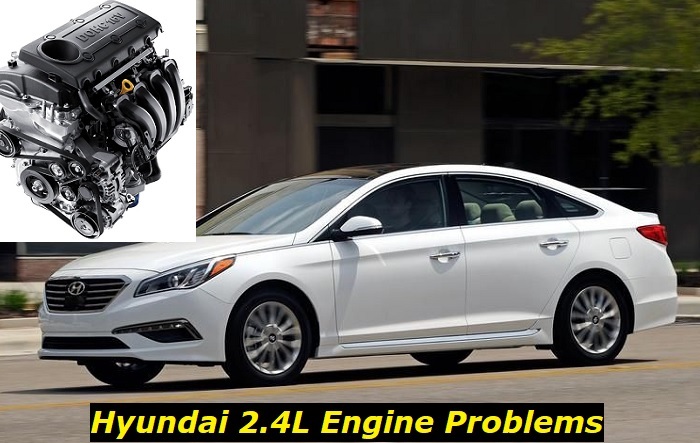Hyundai vehicles are extremely popular in almost all developed countries. These cars are not luxurious, they are always in the mid-price niche, and they are always well-designed. But we can't say that we've seen any technician that would say: "Oh, I love Hyundai engines, they are so good and reliable!" Weird, isn't it?
Today, we'll tell you about the 2.4L engine offered by Hyundai (Theta II series) and about its problems as well as about some other factors like average longevity. You may think this is one of the best Hyundai engines because it has a lot of good reviews and no fatal problems on the list of issues. But you should read the article to the end before making any conclusions.

Key facts and my opinion about the engine
- Production years: 2008-2019
- Average lifespan of G4KE: 190,000-210,000 miles
- Fuel supply type: port injection
- Power range: 170-180 hp
- Fuel efficiency: good
- Engine block material: aluminum
- Engine reliability score: medium
- The most common problems: cylinder warping, weak timing chain, rod bearings premature death, oil leaks.
Some facts about the 2.4L engine in Hyundai cars
We are talking mainly about the Theta II (G4KE) engine which is an MPI engine with a simple injection and nothing special in its construction. It's a 4-cylinder engine that produces 177 horsepower and 170 lb-ft of torque. But a lot of things will also be common for 24 GDI engines as well as for those 2.4-liter engines that work as a part of a hybrid powerplant.
So, the engine is pretty simple in its construction. CVVT system works pretty well and causes no problems. There are some LPG versions used mainly in South Korea for taxi cars and they can easily go over 300,000 miles which is impossibly good for these engines.
Here's what we want to tell you about this engine:
- the aluminum block seems to be a bad decision and it should make the lifespan shorter, but it doesn't;
- the head is very simply constructed and it actually doesn't cause any serious problems;
- the engine is not very powerful given it has 2.4 liters of displacement and could give much more power than it does;
- the GDI version offers direct injection while the MPI version boasts a more durable simple fuel injection system;
- the engine has a timing chain that can live long, but we recommend replacing it every 150,000 miles or even sooner;
- the engine can live pretty well with any oil that meets the manufacturer's standards, but any other oil will not prolong its life.
The engine was installed mainly in the Sonata and Santa Fe. But it was also used in other models including a range of KIA vehicles.
It's hard to find any interesting facts about this engine because it's very simple and practical. These units are not hard to maintain or repair. But when it comes to any serious repairs, you aren't likely to have any success because the aluminum-alloy block leaves no chance of restoring after extensive wear.
Well, if you use optimal oil, the block will live much longer than other parts of the engine, so this is not that important. If you have read up to this point, you could think this is the best engine in the industry. But hold on, we'll now come to the most interesting part.
What's the longevity of the Hyundai 2.4L engine?
This engine can easily go 200,000 miles even in bad conditions with slight overheating and irregular oil changes. If you maintain the engine thoroughly and buy good parts, use good fuel, and ensure it's not overheated, the unit can live much more - over 300,000 miles easily.
The 2.4L Hyundai engine is durable. But during its life, it will throw so many bad surprises at you that you won't think it's so good after 2 or 3 years of use. Still thinking it's a good choice? We have some facts for you.
What are some common issues with your Hyundai 2.4L engine?
Speaking about common problems, we can find dozens of issues that can happen with your Hyundai engine. But some of them are not as expensive and hard to solve as others.
Hyundai issues two major recalls and even paid a multimillion fine together with KIA for fuel injection issues in the 2.4L Theta II engine. Some vehicles haven't still gotten their free repair under recalls and keep posing danger to drivers and passengers.
Well, we've found a couple of the most unpleasant common issues your 2.4L engine may surprise you with.
1. Fuel injection problems
The injectors are OK but the connections between the fuel lines and also between the lines and fuel pump may go bad very quickly. One of the recalls was an issue because the high-pressure fuel pump lost connection with the line and was pouring fuel all around the vehicle which might cause fire danger.
Check if your vehicle has gone through all the needed service stages during the recall campaign. And if not, you can go to the dealer. Actually, the 2011-2014 Hyundai and KIA cars were affected by the issue. But checking the connectors in the fuel supply system of your Hyundai is a good idea on the regular basis.
2. Rod bearings failure
You can rarely find an engine with rod-bearing problems. But the 2.4L Theta II is exactly this kind of engine. The earlier models of this unit were made with poor debris cleaning at a certain manufacturing stage and this debris clogged the oil lines. Sometimes, the oil was just blocked and the rod bearing failed to lead to a complete engine failure.
Actually, the dying rod bearing will not be very hard to locate. The sound of the engine becomes really annoying because of the constant screaming or whining engine. But Sonatas and Santa Fes have been really good soundproofed, so you won't hear them dying.
Checking the rod bearings every time you provide your vehicle with regular maintenance is a very good idea.
3. Excessive oil consumption
After approximately 100,000 miles, these engines will inevitably burn some oil. Piston rings are slightly worn, valve seals are no more flexible. And these issues lead to oil consumption because some oil gets into combustion chambers instead of going to valves or cylinders. If it's just 200-300 grams of oil every 1000 miles, it's not a big problem. But if the consumption goes up to 1 liter per 1000 miles, changing valve seals and piston rings becomes an important step.
Also, you may not notice that the engine burned some oil and this will lead to a low oil level in the engine. This problem may eventually lead to engine damage. Unfortunately, the oil pressure light will go on the dashboard too late. So, better use the dipstick to check the oil level at least once a month.
4. Knocking sounds
Hyundai is not the company that will check and recheck every engine they make. The quality of assembly is not the best either. And this leads to a lot of manufacturing issues (like the one with rod bearings).
Sometimes, Sonata or Santa Fe owners notice that their 2.4-liter engines start knocking. It's not always one of the worst and most expensive problems. But you should stop driving and have the vehicle diagnosed. Sometimes, the thing is in the worn-out cylinders or cylinder block and this will be the end for this engine.
5. Lack of power, stalling
If you experience bad performance in the G4KE engine and it even stalls sometimes, the best option is to check the fuel supply system as well as the electrical system.
We know about two possible reasons for low performance (if it's not about the dead engine with over 300K miles on it):
- Bad current because of a faulty alternator or battery- the current isn't good enough to ignite the sparks, so the engine misfires all the time and lacks power.
- Bad fuel supply. The fuel pump or filter, or injectors are faulty and can't supply the needed fuel pressure for the engine.
After checking and resolving these issues, you can again enjoy the full power of this engine and have some pleasure after pressing the gas pedal hard.
How to make the 2.4L Hyundai engine live longer?
The key thing you should remember is that this engine is pretty hard to overhaul and repair. You should avoid any problems that can kill the 2.4L Hyundai engine.
For this, remember such tips:
- use high-quality fluids and filters for servicing;
- pay attention to the timing belt and cooling system;
- warm up the engine before you start driving at least for 45 seconds;
- buy good fuel, never experiment with cheap gasoline;
- don't ignore check-engine lights or any other warning on the dash;
- don't drive the engine if you hear any unusual noises from it;
- find a good mechanic if you don't want to overpay at a dealership.
These tips are pretty simple to follow and they will allow you to drive your 2.4-liter Hyundai vehicle for many years with no major problems.
About the authors
The CarAraC research team is composed of seasoned auto mechanics and automotive industry professionals, including individuals with advanced degrees and certifications in their field. Our team members boast prestigious credentials, reflecting their extensive knowledge and skills. These qualifications include: IMI: Institute of the Motor Industry, ASE-Certified Master Automobile Technicians; Coventry University, Graduate of MA in Automotive Journalism; Politecnico di Torino, Italy, MS Automotive Engineering; Ss. Cyril and Methodius University in Skopje, Mechanical University in Skopje; TOC Automotive College; DHA Suffa University, Department of Mechanical Engineering






Add comment